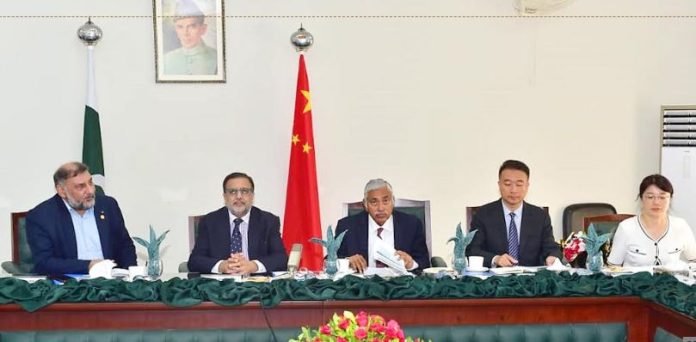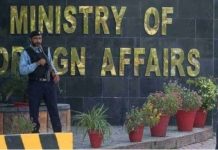ISLAMABAD, SEPT 19 /DNA/ – Chinese Academy of Agricultural Sciences (CAAS) visited the Pakistan Agricultural Research Council (PARC), Islamabad. The visit signifies a major step toward strengthening agricultural cooperation between China and Pakistan, aimed at addressing shared challenges of food security, climate resilience, and sustainable development.
The delegation was warmly received by Dr. Syed Murtaza Hassan Andrabi, Chairman, PARC, who provided a detailed overview of PARC’s national research network. Dr. Andrabi’s presentation highlighted cutting-edge initiatives across multiple scientific disciplines, including genomics, biotechnology, livestock improvement, plant sciences, agricultural engineering, natural resource management, and value chain development.
In a meeting with the Chinese delegation, Rana Tanveer Hussain, Federal Minister for National Food Security and Research welcomed the delegation and reaffirmed Pakistan’s commitment to strengthening agricultural ties with China. He emphasized that food security challenges, exacerbated by climate change, population growth, and dwindling natural resources, require innovative, science-based solutions. “Our collaboration with China opens new doors for technological advancement and sustainable agricultural practices,” he stated. Federal Minister expressed strong support for the proposed CAAS-Modeled Centre of Excellence at NARC, adding that such initiatives would significantly boost Pakistan’s research capacity and rural development. Federal Minister Thanked the Chinese Government for their continuous support to Pakistan’s Agriculture sector.
Speaking on the occasion, Mr. Amir Muhyuddin, Federal Secretary for National Food Security and Research, emphasized the critical role of innovation and international collaboration in shaping the future of agriculture in Pakistan. “The challenges we face—climate change, water scarcity, declining soil fertility, and a rapidly growing population—require science-driven, innovative solutions. International collaboration, particularly with China, offers Pakistan a historic opportunity to modernize agriculture and strengthen food security,” he said.
During the discussions, Chairman PARC emphasized Pakistan’s keen interest in benefiting from China’s expertise in modern and precision agriculture. “Despite limited resources, PARC continues to play a pivotal role in boosting the national economy through research and innovation. We see immense potential in joint ventures with China to address mutual challenges, particularly in climate change adaptation, food insecurity, and sustainable production systems,” he stated. Dr. Andrabi proposed the establishment of Excellence at PARC – National Agricultural Research Centre (NARC) on CAAS model, focused on high-impact research for food security, climate-resilient technologies, and sustainable agricultural development.
Leading the Chinese delegation, Mr. Yan Yan, Consultant at the Division of Asian and African Affairs, MARA, expressed strong support for future cooperation. “China and Pakistan share a longstanding friendship and history of agricultural collaboration,” he stated. “We are committed to continuing our support for Pakistan’s agricultural advancement. Strengthening this partnership will be critical for ensuring food and nutritional security in both our countries.” Mr. Yan also commended PARC’s efforts in driving innovation and appreciated the hospitality extended to the delegation.
This visit marks a renewed chapter in China-Pakistan agricultural cooperation, where innovation, technology transfer, and sustainable practices will form the foundation of a shared future. The proposed Centre of Excellence at NARC is expected to serve as a flagship project under this collaboration, showcasing China-Pakistan agricultural friendship as a model for the region.

















